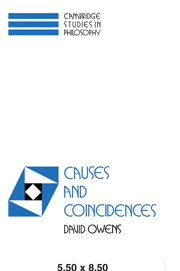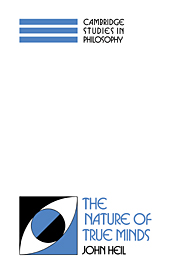Causes and Coincidences
In an important departure from current theories of causation, David Owens proposes that coincidences have no causes, and that a cause is something that ensures that its effects are no coincidence. He elucidates the idea of a coincidence as an event that can be divided into constituent events, the nomological antecedents of which are independent of each other. He also suggests that causal facts can be analyzed in terms of non-causal facts, including relations of necessity. Thus, causation is defined in terms of coincidence, and coincidence without reference to causation. In a book that will be of particular interest to those concerned with the role of causation in the philosophy of mind, David Owens challenges ideas of Hume, Davidson and Lewis, and offers novel solutions to the problems still confronting theorists of causation.
- This book is an important departure from more recent theories of causation. It argues that coincidences have no causes and that a cause is something which ensures that its effects are no coincidence
- David Owens challenges the ideas of Hume, Davidson and Lewis
- Causes and coincidences will be of great interest to philosophers concerned with the role of causal notions in the philosophy of mind
Reviews & endorsements
"...Owens' candor, his willingness to express philosophical puzzlement where puzzles exist for him, is especially refreshing. His book is a lively contribution to the growing literature on causation." Philosophy and Phenomenological Research
Product details
February 2011Adobe eBook Reader
9780511833311
0 pages
0kg
This ISBN is for an eBook version which is distributed on our behalf by a third party.
Table of Contents
- Preface
- Introduction
- 1. The inexplicability of a coincidence
- 2. Causes and laws
- 3. Events and non-causal explanations
- 4. Causal explanation
- 5. The direction of causal explanation
- 6. Levels of causation
- 7. Deviant causal chains
- 8. Causation in action
- Conclusion: whither causal realism?
- Bibliography
- Index.



